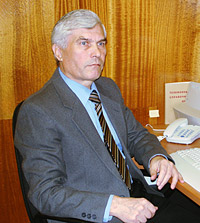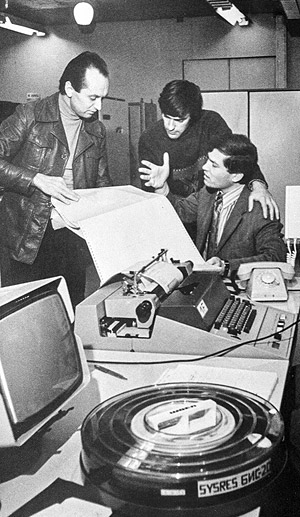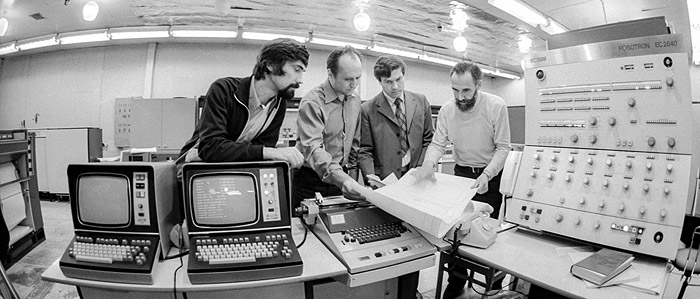
Electronic english version since 2022 |
The newspaper was founded in November 1957
| |
For the jubilee of LCTA - MLIT
To maintain a zest for life
We keep publishing memoirs from the employees of Meshcheryakov Laboratory of Information Technologies. MLIT Deputy Chief Engineer Nikolay KARPENKO that came to Dubna to prepare his diploma project in 1969, is sharing his life story.
 About time and about himself:
About time and about himself:
beginning of the path
I attended a rural school in the Khmelnytskyi Region. I was a good student and managed to do my homework during breaks. The son of the school principal that taught math, was in our class. To keep his own son interested, he invited me to tutor he and me in math at their home. These lessons sparked my interest in the subject. For some reason, the literature teacher, a stern veteran missing an arm, also singled me out. He invited me home to help filling out his journal and also taught me some extra lessons. By the end of the 8th grade, I focused on Russian language, literature and math. I sent my essays to the regional newspaper, participated in literary competitions and even entered the Vinnytsia Pedagogical Institute without taking exams.
I graduated from high school with a gold medal and entered Odessa State University in the company of a classmate whose older sister studied mathematics. After my third year, I was offered a course in computational mathematics and computers. I didn't know what that meant then. They showed me a computer room with a Ural-2 computer - a huge one, capable of 100 operations per second! It seemed incredible and I immediately wanted to study in that department. When choosing my thesis topic, I was offered doing a pre-graduation internship in Moscow that meant Dubna or the E.O.Paton Electric Welding Institute in Kiev. I chose the former and was given the home address of Iosif Moiseevich Ivanchenko and the phone number of Nikolay Nikolaevich Govorun. I stayed with Ivanchenko for several days, as a dorm room wasn't immediately available. Literally a week later, I.M.Ivanchenko's group left for an accelerator session at IHEP (Protvino), where I was included. I immediately immersed myself in the experiment at the U-70 accelerator. I successfully defended my thesis and the department told me they were inviting me to work in Dubna. It turned out that Nikolay Nikolaevich and Head of the department were good friends and Govorun regularly solicited graduates for his position.
Sessions and experiments
There wasn't a vacant position at LCTA, so Govorun sent me to Moscow, to the Scientific Research Institute of Nuclear Physics at Moscow State University, "You'll only be on the books there, but you'll be working with us." I continued working in Ivanchenko's group but not for long, I was drafted into the navy. I served a year in the Pacific Fleet, where I teached mathematics to officers planning to enroll in the General Staff Academy.
 |
| BIS-2 Protvino. Iosif Ivanchenko, Alexander Senner and Nikolay Karpenko |
When the session was in progress, we didn't care about time; we'd work around the clock. Sometimes, the experiment would completely grind to a halt. Ivanchenko would be running around, nervous, while Sasha Senner and I would pull out our chess sets and start playing. We'd be playing and playing and suddenly, "Oh! We didn't check that!" We'd check it and that was it, the work was underway. Petr Moisenz rarely attended the sessions; he developed software to process the data from the Neutrino Detector. He was calm and confident, never nervous and I had a very good relationship with him. He was a strong mathematician and if any questions arose, he was always there to help. Our team also included Tolya Chvyrov, Igor Evsikov, Mila Senner and Zoya Kozhenkova; it was a large, strong group. A little later, Yulia Sharapova joined us and Volodya Palchik that today works at MLIT, transferred from the Laboratory of Theoretical Physics. The group was friendly; when we could get together, we'd go for barbecues and football matches.
Every summer, I went hiking and kayaking with schoolchildren along the Volga, the Ural and the rivers of Karelia. I was one of the founders of Scouting in Dubna in the 1990s but somehow, it never really caught on in the city. We were probably ahead of our time. The ideas behind this movement were good - duty to God and the Motherland, helping others. It was a test run for new ways of working with children and youth.
Supervisors
On N.N.Govorun's recommendation, I became secretary of production meetings for M.G.Meshcheryakov and took minutes of the meetings. Nikolay Nikolaevich and Mikhail Grigorievich had very different personalities. You could drop into Govorun's office at any time to talk, or come to his home to discuss any issue. Our daughters were in the same class and I took them on hikes. Mikhail Grigorievich was a stern man both in appearance and in his actions. If I forgot even a single comma in the minutes, he would express his displeasure. We rarely communicated with him - we were different generations, after all, but I communicated with Govorun a lot. Meshcheryakov was a strong, demanding leader. Govorun was a very open, simple person, easy to get along with. I never heard him raise his voice at anyone. He was deputy director and head of the department for mathematical processing of experimental data that included Ivanchenko's sector. When we were sent to Taldom to harvest potatoes, he went with us. We were brought to Dubna by bus and afterwards, Nikolay Nikolaevich drove his Zhiguli car around town, driving employees with sacks of potatoes to their homes. He helped me a lot. He pushed me to write my thesis: there was a lot of material but there was no time to format it. My thesis supervisors were N.N.Govorun and I.M.Ivanchenko.
Once, the administration informed us that an experiment was being scheduled that should yield quick results: controlling the trajectories of charged particles with the use of a single crystal. Indeed, the experiments were still underway and the result had already been published. The experiment "Crystal" was carried out by a group of physicists from LHEP and programmers from LCTA at the JINR accelerator. Incidentally, I was lucky - world-class results were obtained in all the experiments which I participated in.

Alexander Senner, Iosif Ivanchenko, Nikolay Karpenko, Mikhail Shafranov (LHEP), 1980
About machines and people
I love being around people; that's how I feel most comfortable. When I started working there, this building didn't exist yet; the BESM-6 machines were housed in the building next to the Laboratory of Theoretical Physics. We helped to build the new LCTA building, regularly participating in cleanups and picking up trash. Today, the building changes too; I'd say it gets better. As for the people, we were dedicated to our work and spent all our time working together. I think people in our laboratory communicate more with each other, especially back then, when we had shared-use machines - the CDC-6200, CDC-6500, ES-1040 and ES-1060 that everyone rallied around.
Collaborative life was vibrant in all the laboratories back then: creative groups performed in the community centre. LCTA was famous for its wall newspaper "Impulse" with its authors' notes and drawings on topical issues.
About Dubna and beyond
Dubna captivated me with its quiet, cozy atmosphere compared to the hustle and bustle of Moscow, where I spent several days. But here - silence, the scent of lilacs. Dubna was still small then. The Volga also captivated me, as did the sea in Odessa, we had a tiny river in our village.
Business trips abroad were difficult at first; they even wouldn't let me into Bulgaria, without explanation. As it turned out later, the travel restrictions were related to my service in the Pacific Fleet. In the 2000s, Yu.K.Potrebenikov recommended me for the HERA-B experiment (DESY, Germany), which I participated in for five years, three months there, three months here. But I always longed to go home; only here did I feel comfortable.
Instead of an epilogue
Interest in life is determined by the choice of a goal. I believe there should be several, but one of them should be global, reaching beyond the horizon, such as understanding the world. It may take decades or never be achieved but it drives a person. To avoid disappointment, there should be short-term and achievable goals: an experiment has been carried out, the results obtained and published, a step forward. When there is no big goal, or more simply, a dream, interest in life is lost.
Since 2007, I have been working as Deputy Chief Engineer of Laboratory, later, for two terms - as Chief Engineer. I think the people around you play a significant role. It may seem strange, but I've been surrounded by women my whole life. And that's a good incentive to live and achieve. When I worked in experimental groups, it was never a problem for me to ask if I didn't know anything. And later, as a deputy and chief engineer, I encountered things related to computer technology and networks that I didn't know in detail. I relied on people I trusted and consulted with them.
On the eve of the 60th anniversary of the Laboratory, I want to wish my colleagues interesting work, good health to my generation and those older than me, good luck to everyone and to the youth that they have a dream, that they know what they live for and that they love their laboratory and their city.
Recorded by Olga TARANTINA